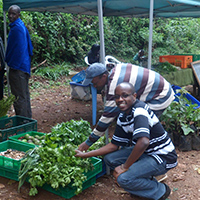Improved traceability can enhance trust among organic farmers and traders
A survey of the organic fresh produce chain in Nairobi concludes that perception to traceability, documentation, certification, training and monitoring can strengthen the confidence between the producers and the traders of the organic sector.

By Josphat Njenga Gichure, Food safety consultant
With growth in organic production in the recent decade, trust is emerging as an important factor in making food choices among consumers due to the credence nature of organic foods. Credence attributes are products attributes which a consumer cannot ascertain during purchase of the product. Credence attributes in the organic sectors include area/ location of production, external inputs used, name of producer, status of organic certification for producer, transportation, storage and processing in the case of processed products.
Lack of sharing of information about these attributes may create mistrust between the actors. In food safety and quality management, traceability systems are used to convey information among different actors.
Traceability is the ability to trace the history, application or location of a product at all stages of production and distribution by means of recorded identifications. Traceability involves recording flow of products and production attributes into either paper or electronic based systems.
Management of information flow among value chain actors through a traceability system is important to enhance consumers’ assurance on safety and quality of food. Therefore, in connection with my master thesis, I have conducted a survey of the organic fresh produce chain in Nairobi in order to establish factors to consider in design of a traceability system. The study concludes that a number of factors should be taken into consideration, such as perception to traceability, documentation, certification using alternative quality management standards, training and monitoring of existing systems.
Challenges ahead
The main challenges to implementing a traceability system is the perceived high cost of implementing a traceability system, inadequate training of personnel on traceability, lack of a centralized system specifically designed for fresh produce, incomplete record keeping and delinked planting and harvesting information in retail as information transfer is to immediate actors.
In conclusion, conducting organizational activities such as record keeping, training and monitoring of a traceability system among several organizations will create efficiencies by lowering the cost associated with implementing traceability system. On the basis of this study, an increased awareness on traceability among actors on the benefits of traceability is recommended; specifically on how to implement and monitor the system.